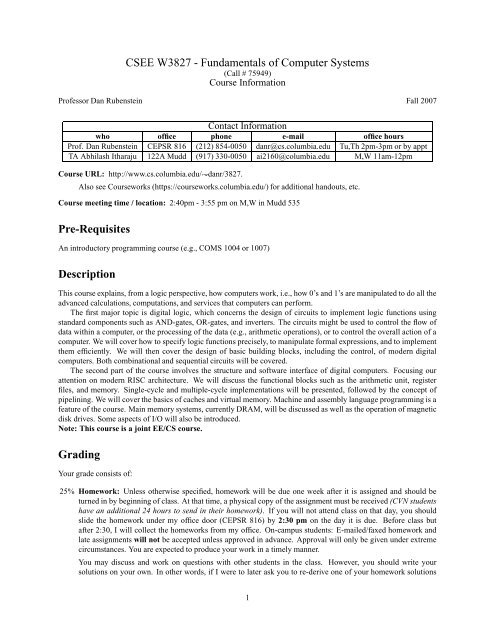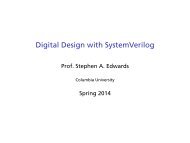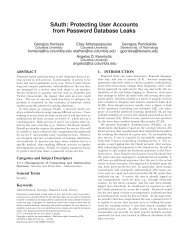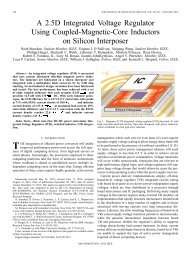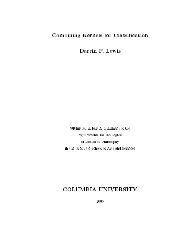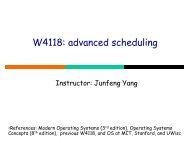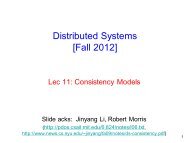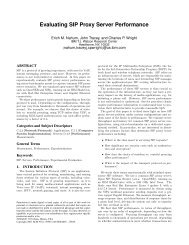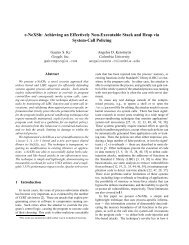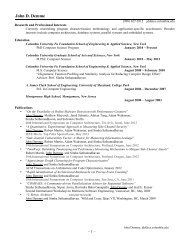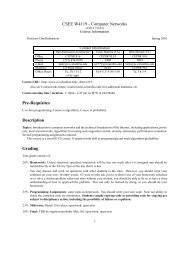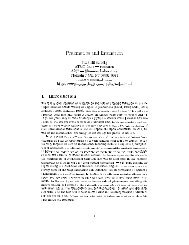CSEE W3827 - Fundamentals of Computer Systems Pre-Requisites ...
CSEE W3827 - Fundamentals of Computer Systems Pre-Requisites ...
CSEE W3827 - Fundamentals of Computer Systems Pre-Requisites ...
You also want an ePaper? Increase the reach of your titles
YUMPU automatically turns print PDFs into web optimized ePapers that Google loves.
<strong>CSEE</strong> <strong>W3827</strong> - <strong>Fundamentals</strong> <strong>of</strong> <strong>Computer</strong> <strong>Systems</strong><br />
(Call # 75949)<br />
Course Information<br />
Pr<strong>of</strong>essor Dan Rubenstein Fall 2007<br />
Contact Information<br />
who <strong>of</strong>fice phone e-mail <strong>of</strong>fice hours<br />
Pr<strong>of</strong>. Dan Rubenstein CEPSR 816 (212) 854-0050 danr@cs.columbia.edu Tu,Th 2pm-3pm or by appt<br />
TA Abhilash Itharaju 122A Mudd (917) 330-0050 ai2160@columbia.edu M,W 11am-12pm<br />
Course URL: http://www.cs.columbia.edu/ danr/3827.<br />
Also see Courseworks (https://courseworks.columbia.edu/) for additional handouts, etc.<br />
Course meeting time / location: 2:40pm - 3:55 pm on M,W in Mudd 535<br />
<strong>Pre</strong>-<strong>Requisites</strong><br />
An introductory programming course (e.g., COMS 1004 or 1007)<br />
Description<br />
This course explains, from a logic perspective, how computers work, i.e., how 0’s and 1’s are manipulated to do all the<br />
advanced calculations, computations, and services that computers can perform.<br />
The first major topic is digital logic, which concerns the design <strong>of</strong> circuits to implement logic functions using<br />
standard components such as AND-gates, OR-gates, and inverters. The circuits might be used to control the flow <strong>of</strong><br />
data within a computer, or the processing <strong>of</strong> the data (e.g., arithmetic operations), or to control the overall action <strong>of</strong> a<br />
computer. We will cover how to specify logic functions precisely, to manipulate formal expressions, and to implement<br />
them efficiently. We will then cover the design <strong>of</strong> basic building blocks, including the control, <strong>of</strong> modern digital<br />
computers. Both combinational and sequential circuits will be covered.<br />
The second part <strong>of</strong> the course involves the structure and s<strong>of</strong>tware interface <strong>of</strong> digital computers. Focusing our<br />
attention on modern RISC architecture. We will discuss the functional blocks such as the arithmetic unit, register<br />
files, and memory. Single-cycle and multiple-cycle implementations will be presented, followed by the concept <strong>of</strong><br />
pipelining. We will cover the basics <strong>of</strong> caches and virtual memory. Machine and assembly language programming is a<br />
feature <strong>of</strong> the course. Main memory systems, currently DRAM, will be discussed as well as the operation <strong>of</strong> magnetic<br />
disk drives. Some aspects <strong>of</strong> I/O will also be introduced.<br />
Note: This course is a joint EE/CS course.<br />
Grading<br />
Your grade consists <strong>of</strong>:<br />
25% Homework: Unless otherwise specified, homework will be due one week after it is assigned and should be<br />
turned in by beginning <strong>of</strong> class. At that time, a physical copy <strong>of</strong> the assignment must be received (CVN students<br />
have an additional 24 hours to send in their homework). If you will not attend class on that day, you should<br />
slide the homework under my <strong>of</strong>fice door (CEPSR 816) by 2:30 pm on the day it is due. Before class but<br />
after 2:30, I will collect the homeworks from my <strong>of</strong>fice. On-campus students: E-mailed/faxed homework and<br />
late assignments will not be accepted unless approved in advance. Approval will only be given under extreme<br />
circumstances. You are expected to produce your work in a timely manner.<br />
You may discuss and work on questions with other students in the class. However, you should write your<br />
solutions on your own. In other words, if I were to later ask you to re-derive one <strong>of</strong> your homework solutions<br />
1
or to solve a similar problem when you were without your friends, you should be able to do so or have a clear<br />
understanding <strong>of</strong> how to approach the problem. This can only be learned by doing, so you should do your<br />
homework.<br />
35% Midterm: October 15 in-class, closed book, no calculators. You must let Pr<strong>of</strong>essor Rubenstein know a month in<br />
advance (i.e., by next week) if you cannot take the midterm on that date. Otherwise, only medical emergencies<br />
(with doctor’s note) are acceptable reasons for scheduling an alternate date. This applies to both in-class and<br />
CVN students (CVN students have the entire day to take the exam, but it must be on Oct 15).<br />
40% Final: TBD by registrar, closed book, no calculators.<br />
Exams: I try to test your understanding <strong>of</strong> a concept, and not just straightforward regurgitation <strong>of</strong> formulae, i.e.,<br />
why certain rules, laws, and techniques hold and are used. Hence, I try to design the midterm and final questions to test<br />
your understanding <strong>of</strong> the concepts, not your memorization skills. I realize that some memorization will undoubtedly<br />
be required, but hopefully the memorized concepts will be those that can be re-derived via your intuition. I usually<br />
take a problem covered in class and put a small “twist” on it, so that blind application <strong>of</strong> the method won’t work, but<br />
if you have the kind <strong>of</strong> understanding I am looking for (e.g., the kind that the inventor <strong>of</strong> the method had), you will<br />
know how to adapt the method.<br />
A note on effort: Your grade will mainly be a reflection <strong>of</strong> how you perform on the midterm and final. Homework<br />
grades don’t have much <strong>of</strong> an effect, as long as homework is turned in (i.e., most students typically get most <strong>of</strong> the<br />
problems right). You should do the homework so that you learn the material. If you find yourself copying or getting<br />
solutions from someone else without putting in the effort <strong>of</strong> solving them yourself, you’ll probably find yourself doing<br />
poorly on the exams. You won’t get much sympathy from me if you come crying to me at the end <strong>of</strong> the term that you<br />
did well on the homework yet poorly on the midterm and final.<br />
If you are a bad test-taker, there is hope! Show me (i.e., in <strong>of</strong>fice hours and class) that you understand what is<br />
going on, and I take that into account when assigning the final grade.<br />
How much I care about helping students is directly proportional to how much you seem to care about the<br />
class (i.e., via attendance, homework, coming to <strong>of</strong>fice hours). I have nothing personal against students who think<br />
the class is a waste <strong>of</strong> their time or think they have better things to do with their time. I also have lots to do besides<br />
teaching, and will only make the extra effort for those students who earn it by putting in the extra effort themselves<br />
(active in class, active at <strong>of</strong>fice hours).<br />
Reading / Texts<br />
Two texts are required:<br />
<strong>Fundamentals</strong> <strong>of</strong> Digital Logic with VHDL Design, 2nd ed, Stephen Brown and Zvonko Vranesic, McGraw-Hill,<br />
ISBN #0-07-249938-9<br />
<strong>Computer</strong> Organization and Design, The Hardware/S<strong>of</strong>tware Interface, David A. Patterson and John L. Hennessy,<br />
Morgan Kaufmann, ISBN #1-55860-604-1<br />
Computing Accounts<br />
Not required for the course.<br />
2
Cheating<br />
In short: don’t do it. Be warned now - I take cheating very seriously. If you are caught cheating on the midterm or<br />
final, you will fail the class and I will likely take additional action which can result in your suspension or expulsion<br />
from Columbia. It’s not worth putting yourself in this position.<br />
If a grade is that important to you then you should be putting in the extra effort, i.e., reading the book, coming to<br />
<strong>of</strong>fice hours, etc.<br />
You must use common sense about when to collaborate / use notes / calculators, etc. If you are unsure <strong>of</strong> a policy,<br />
you should ask me or Abhilash first before doing something you (and I) might consider unethical. Both I and Abhilash<br />
will be putting a lot <strong>of</strong> time into teaching you this course. Our goal is to teach you the material. Grades on homeworks,<br />
midterms, and finals are not only a means to evaluate you, but also a means to force you to learn the course material.<br />
If you do your own work but facilitate someone else’s cheating, you run a risk <strong>of</strong> getting in trouble as well. This<br />
is because you run the risk <strong>of</strong> having me determine who copied from whom. If you feel that someone is pressuring<br />
you to help them in a way that makes you uncomfortable, come talk to me / send me e-mail. You should feel free (and<br />
actually I would encourage you) to:<br />
Discuss homework problems / give hints / work together through a part <strong>of</strong> a problem that you are stuck on<br />
Study for the midterm / final together<br />
Student Feedback<br />
I’m always looking for ways to improve the course. If you have any comments or criticism about the course, or find<br />
any mistakes or misleading facts / comments in the lecture, please feel free to contact me. This includes comments on<br />
the material being covered, teaching style, pace <strong>of</strong> the class, workload, etc. I will try and accommodate, but I can’t<br />
make any promises...<br />
Things to know about Pr<strong>of</strong>essor Rubenstein<br />
I write on the board (i.e., I rarely use slides, I don’t provide handouts, etc.) so if you want to know what is going<br />
on in class, come to class, or get a friend to take notes. Strangely enough, if you’re paying attention, I believe<br />
you learn alot more when taking notes yourself. For some reason, when you just read <strong>of</strong>f <strong>of</strong> notes, your brain<br />
tricks itself into thinking it’s seen everything when it hasn’t. Also, if you have good pre-packaged notes, what<br />
do you need me for?<br />
For this course, we will follow the books fairly closely, but not exactly - many parts <strong>of</strong> the books will not be<br />
included. It’s what’s covered in class and not what’s in the book that you are expected to know.<br />
I respond to e-mail in batches. I get between 50-100 e-mails a day that require a response. I read everything as<br />
it comes in (Unless traveling, I check e-mail several times during the day, before I go to bed, when I wake up,<br />
etc.) but if an e-mail takes more than a minute to craft a response, I usually wait to answer it. Roughly once<br />
or twice a week, I do a sweep <strong>of</strong> my inbox and respond to e-mails in a batch. So if you have questions on the<br />
homework and cannot come to <strong>of</strong>fice hours, my advice is to not wait until the last minute if you want me to<br />
answer questions via e-mail.<br />
Some Outside Thoughts (from Columbia Underground Listing <strong>of</strong> Pr<strong>of</strong>essor Ability (CULPA) at www.culpa.info)<br />
For ELEN E4710: Intro to Networking Theory (from someone who isn’t my biggest fan):<br />
“My worst academic experience. Pay 200% attention during lectures if you are taking his class since<br />
nothing he teaches in lectures will be found in the textbooks. Never buy the textbook he assigned<br />
since I have never used it once. Pr<strong>of</strong>essor Rubenstein seems to be a very smart person and he gets<br />
annoyed with questions. Don’t take his class if you have problems getting up. He always has 9:00am<br />
classes, hws are due at the beginning <strong>of</strong> the class and LATE assignments are never accepted, even if<br />
you arrive 30 seconds after the lecture has started. Homeworks are very very difficult, so are exams.<br />
3
you are doing really well if you get above 70% in HWs. Midterms and final scores usually averaged<br />
around ¡ £¢ %.<br />
Workload: Around 7 - 8 assignments. Due dates usually get postponed since he never finishes the<br />
materials on time.”<br />
Alot <strong>of</strong> this was true for 4710: I didn’t follow a book at all (I didn’t think any book was at the right math level)<br />
but expect to be closer to the book here. I don’t agree that I don’t like questions. I’m much tougher in the<br />
networking course than this course, but I do believe in tough exams (to really push you on what you know) and<br />
curving the grades accordingly (i.e., a 40 on an exam doesn’t mean you fail).<br />
I’m willing to put time into helping those students who truly put effort into the class. I judge this by them<br />
coming to <strong>of</strong>fice hours and showing me where they get stuck on a problem, clarifying something they didn’t<br />
understand in <strong>of</strong>fice hours, answering relevant questions in class, and/or showing me in class that they’re truly<br />
thinking about the material (i.e., asking an insightful question).<br />
I find it a waste <strong>of</strong> time to put effort into students who don’t put effort into the class. Some <strong>of</strong> you will disappear<br />
after a few lectures, copy your homework, and then get crushed on the midterm (and probably on the final later<br />
on as well). Don’t come to me if all you want is sympathy, or to explain to me that you understand the material<br />
and don’t know what happened. You can come to me if you want to get back on track, but my suggestion will<br />
be: do your homework, come to class, come to <strong>of</strong>fice hours, i.e., put in effort.<br />
4


